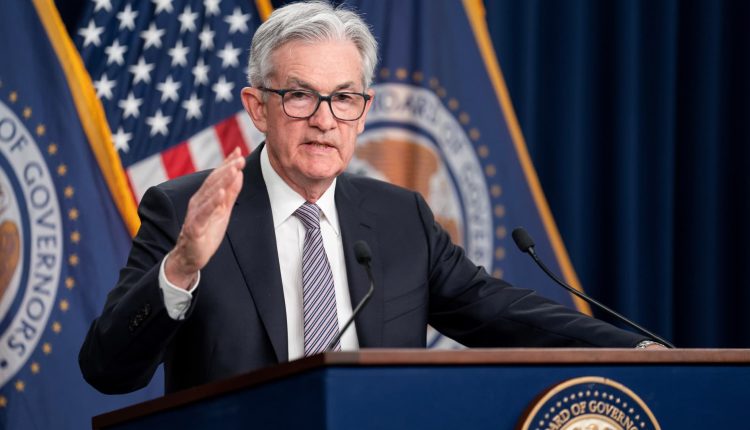The Federal Reserve on Wednesday held its key interest rate steady for the third straight time and set the table for multiple cuts to come in 2024 and beyond.
With the inflation rate easing and the economy holding in, policymakers on the Federal Open Market Committee voted unanimously to keep the benchmark overnight borrowing rate in a targeted range between 5.25%-5.5%.
Along with the decision to stay on hold, committee members penciled in at least three rate cuts in 2024, assuming quarter percentage point increments. That’s less than market pricing of four, but more aggressive than what officials had previously indicated.
Markets had widely anticipated the decision to stay put, which could end a cycle that has seen 11 hikes, pushing the fed funds rate to its highest level in more than 22 years. There was uncertainty, though, about how ambitious the FOMC might be regarding policy easing. Following the release of the decision, the Dow Jones Industrial Average jumped more than 400 points, surpassing 37,000 for the first time.
The committee’s “dot plot” of individual members’ expectations indicates another four cuts in 2025, or a full percentage point. Three more reductions in 2026 would take the fed funds rate down to between 2%-2.25%, close to the long-run outlook, though there was considerable dispersion in the estimates for the final two years.
Markets, though, followed up the meeting and Chair Jerome Powell’s press conference by pricing in an even more aggressive rate-cut path, anticipating 1.5 percentage points in reductions next year, double the FOMC’s indicated pace.
In a possible nod that hikes are over, the statement said that the committee would take multiple factors into account for “any” more policy tightening, a word that had not appeared previously.
“While the weather is still cold outside, the Fed has suggested a potential thawing of frozen high interest rates over the next few months,” said Rick Rieder, chief investment officer of global fixed income at asset management giant BlackRock.
Along with the interest rate hikes, the Fed has been allowing up to $95 billion a month in proceeds from maturing bonds to roll off its balance sheet. That process has continued, and there has been no indication the Fed is willing to curtail that portion of policy tightening.
Inflation ‘eased over the past year’
The developments come amid a brightening picture for inflation that had spiked to a 40-year high in mid-2022.
“Inflation has eased from its highs, and this has come without a significant increase in unemployment. That’s very good news,” Chair Jerome Powell said during a news conference.
That echoed new language in the post-meeting statement. The committee added the qualifier that inflation has “eased over the past year” while maintaining its description of prices as “elevated.” Fed officials see core inflation falling to 3.2% in 2023 and 2.4% in 2024, then to 2.2% in 2025. Finally, it gets back to the 2% target in 2026.
Economic data released this week showed both consumer and wholesale prices were little changed in November. By some measures, though, the Fed is nearing its 2% inflation target. Bank of America’s calculations indicate that the Fed’s preferred inflation gauge will be around 3.1% year over year in November, and actually could hit a 2% six-month annualized rate, meeting the central bank’s goal.
The statement also noted that the economy “has slowed,” after saying in November that activity had “expanded at a strong pace.”
In the news conference, Powell said: “Recent indicators suggest that growth in economic activity has slowed substantially from the outsized pace seen in the third quarter. Even so, GDP is on track to expand around 2.5% for the year as a whole.”
Committee members upgraded gross domestic product to grow at a 2.6% annualized pace in 2023, a half percentage point increase from the last update in September. Officials see GDP at 1.4% in 2024, roughly unchanged from the previous outlook. Projections for the unemployment rate were largely unchanged, at 3.8% in 2023 and rising to 4.1% in subsequent years.
Officials have stressed their willingness to hike rates again if inflation flares up. However, most have said they can be patient now as they watch the impact the previous policy tightening moves are having on the U.S. economy.
Stubbornly high prices have exacted a political toll on President Joe Biden, whose approval rating has suffered in large part because of negative sentiment on how he has handled the economy. There had been some speculation that the Fed could be reluctant to make any dramatic policy actions during a presidential election year, which looms large in 2024.
However, with real rates, or the difference between the fed funds rate and inflation, running high, the Fed would be more likely to act if the inflation data continues to cooperate.
Read the full article here

